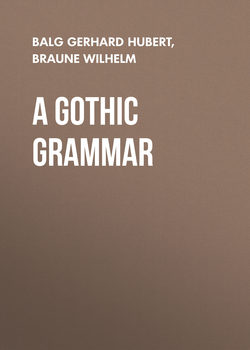Читать книгу A Gothic Grammar - Braune Wilhelm - Страница 5
FONOLOGY
CHAP. II. THE VOWELS
i
Оглавление§ 9. Gothic i, as a rule, denotes the short vowel i [as in E. it], while its corresponding long sound is represented by ei [= ie in E. believ]; s. § 16.
Note 1. The i in Greek words stands for short ι, only exceptionally for η which is generally represented by ê; e. g., Aúnisimus, Ὀνήσιμος; Biþania, Βηθανία.
Note 2. i in Gothic words is long, when it is incorrectly employd for ê (cp. § 7, n. 3).
§ 10. The Gothic i, from an historical point of view, is of two kinds: It represents two originally distinct sounds which, from a purely Gothic standpoint, can not be separated.
(a) Goth. i = proethnic Germanic e (OHG. ë or i; cp. ahd. gr., §§ 28-30), as in the prs. tense of verbs of the III. – V. ablaut-series (§§ 32-34): niman, OHG. nëman; giban, OHG. gëban; giba, OHG. gëba; bindan, OHG. bintan; itan, to eat; midjis, 'medius'; hlifan, to steal; swistar, OHG. swëster; fidwôr, four; gifts, gift; -qiss, speech; the pps. of the V. ablaut-series: gibans, itans, lisans, wigans, qiþans.
(b) Goth. i = proethnic Germanic i (OHG. i; ahd. gr., § 31); e. g., lists, stratagem; fisks, fish; is, he; wissa, I knew; skritnan, to rend (intr.); prt. pl. and pp. of the verbs of the I. ablaut-series (§ 30): bitun, bitans (inf. beitan); stigun, stigans (inf. steigan); liþun, liþans (inf. leiþan).
Note 1. Final i occurs in ni, bi, si, hiri; in the nominativs of feminin and neuter j-stems: bandi (§ 96), kuni (§ 93); in the acc. and voc. sg. of the masculin j-stems: hari (§ 90); 3d pers. sg. prt. opt.: nêmi. This final i appears as j, when it becums medial (§ 45).
Note 2. Final i before a following i of an enclitic word is elided in nist (= ni-ist), sei (= si-ei), niba (= ni-iba).
Note 3. Every i before h and r is broken to aí; cp. § 20.
Note 4. ij is found in ija, 'eam'; þrija, 'tria'; fijan, to hate; frijôn, to luv; sijum, we ar; kijans, germinated, etc. i for ij is rare: fian, sium, etc., but friaþwa (beside frijaþwa), luv, occurs very often.
Note 5. Occasionally e takes the place of i; as, usdrebi; Mk. V, 10; seneigana; I. Tim. V, 1.
Note 6. For i in the difthong iu, s. §§ 18. 19.
Note 7. For a separation of the two is (= OHG. ë and i) in East Gothic names, s. Wrede, 'Ostg.', 162.
